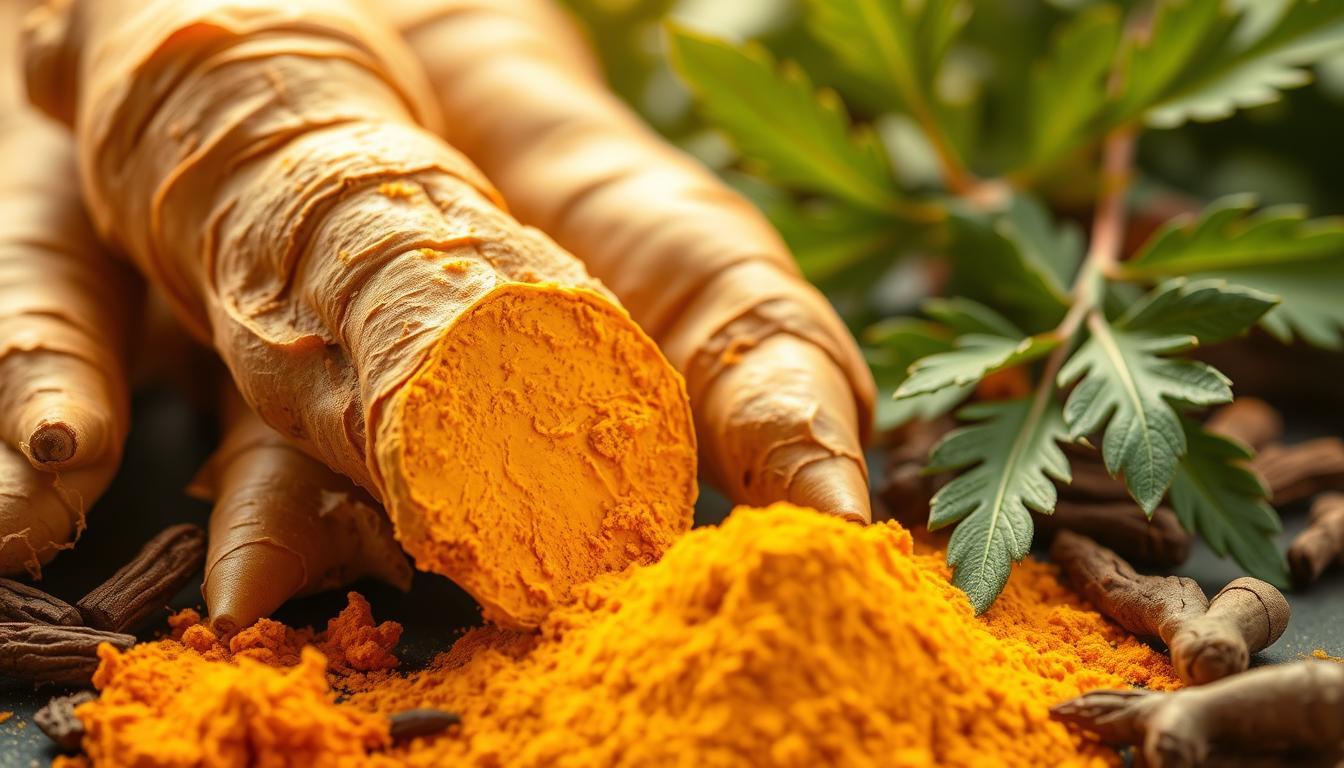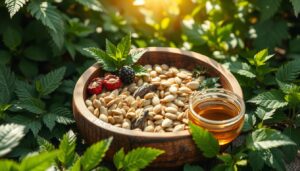Turmeric, a vibrant golden spice derived from the Curcuma longa plant, has been revered for its remarkable medicinal properties for over 4,000 years. At the heart of turmeric’s power lies its active compound, curcumin, which possesses potent anti-inflammatory and antioxidant capabilities. Numerous studies have explored the remarkable potential of this ancient spice to alleviate inflammation, soothe joint pain, and manage a variety of chronic health conditions, making it a natural ally in the fight against inflammation.
Key Takeaways
- Turmeric contains curcumin, a powerful anti-inflammatory compound with antioxidant properties.
- Studies suggest turmeric may help reduce inflammation, alleviate pain, and manage conditions like arthritis, heart disease, and cancer.
- Turmeric has been used for centuries in traditional medicine, particularly in India and other parts of Asia.
- Incorporating turmeric into your diet or taking it as a supplement may provide natural relief for inflammatory conditions.
- Consult with your healthcare provider before using turmeric, as it may interact with certain medications.
Understanding Turmeric and Its Active Compound Curcumin
Turmeric, the vibrant yellow spice derived from the Curcuma longa plant, has long been revered for its medicinal properties. At the heart of turmeric’s therapeutic benefits is its active compound, curcumin – a natural polyphenol with potent antioxidant and anti-inflammatory properties.
What Makes Turmeric a Powerful Anti-inflammatory Agent
The curcumin content in turmeric, typically ranging from 1-6% by weight, is responsible for its remarkable anti-inflammatory effects. Curcumin is a versatile compound that can effectively neutralize free radicals and inhibit the production of inflammatory molecules, making it a natural alternative to conventional anti-inflammatory drugs.
The Science Behind Curcuminoids
Curcumin belongs to a group of compounds called curcuminoids, which are polyphenols that act as powerful antioxidants. These bioactive compounds help protect the body against oxidative stress and cellular damage, contributing to turmeric’s wide-ranging health benefits.
Historical Use in Traditional Medicine
The medicinal use of turmeric has a long and rich history, dating back nearly 4,000 years in Ayurvedic medicine. Turmeric has been used to treat various health conditions, including skin disorders, allergies, and joint pain. Its anti-inflammatory and antioxidant properties have made it a valuable natural remedy in traditional healing practices.
While the curcumin content in turmeric is relatively low, its bioavailability can be enhanced by consuming it with black pepper or healthy fats, which can increase absorption by up to 2,000%. This synergistic effect makes turmeric a potent and versatile natural supplement for supporting overall health and well-being.
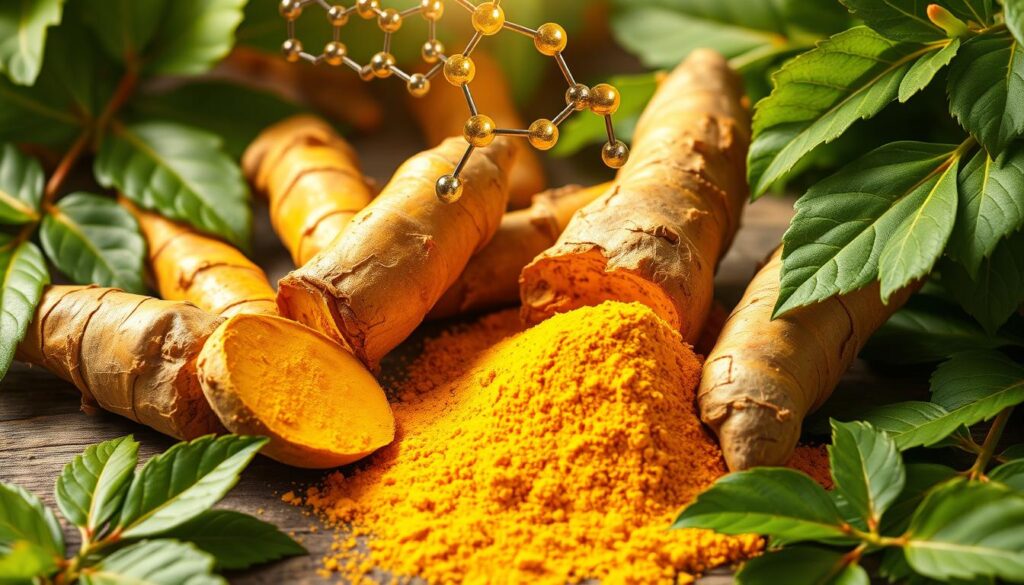
Benefits of Turmeric for Inflammation: Scientific Evidence
Numerous scientific studies have demonstrated the potential of turmeric and its active compound, curcumin, in reducing inflammation across various health conditions. Research suggests that turmeric supplements for arthritis and natural remedies for joint pain may provide significant relief.
One study found that curcumin was as effective as certain anti-inflammatory drugs in reducing pain and inflammation associated with arthritis. Another study reported the protective effects of curcumin, chlorogenic acid, and beta-carotene against radiation-induced chromosomal damage.
Turmeric has also shown promise in managing chronic conditions like digestive issues, depression, diabetes, heart disease, and Alzheimer’s disease. A double-blind, randomized placebo-controlled study demonstrated the efficacy of turmeric (curcumin) in reducing post-operative fatigue and pain.
“Curcuminoids were found to enhance memory in an amyloid-infused rat model of Alzheimer’s disease.”
Additionally, curcumin has been found to inhibit the inflammatory response and proliferation of cells associated with sclerosing cholangitis, a chronic liver condition. High-dose curcuminoids have also been effective in reducing symptoms and signs of oral lichen planus.
With over 3,000 publications on the medicinal use of turmeric in the last 25 years, the scientific evidence for its anti-inflammatory properties continues to grow. Turmeric’s long history of use in traditional medicine, dating back nearly 4,000 years, further supports its potential as a natural, safe, and effective remedy for inflammation and related health concerns.
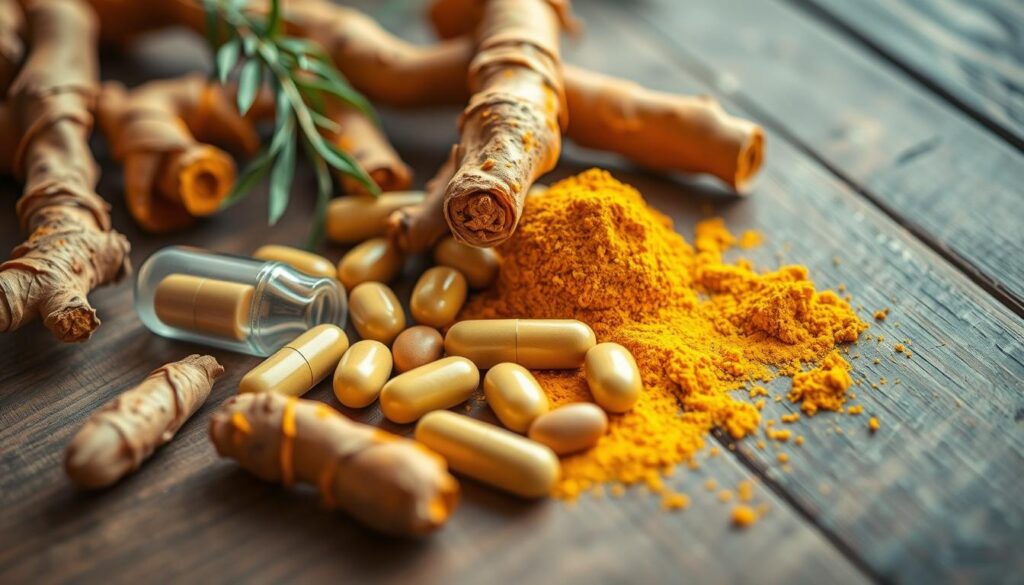
How Turmeric Fights Chronic Inflammation in the Body
Turmeric, a vibrant yellow spice often used in Indian cuisine, has gained widespread attention for its potential anti-inflammatory properties thanks to its active compound, curcumin. Curcumin works at the cellular level to combat inflammation throughout the body, offering a natural alternative to conventional anti-inflammatory drugs.
Cellular Response to Curcumin
Curcumin has been shown to inhibit the activity of several key inflammatory enzymes and cytokines, which are the chemical messengers that trigger and perpetuate the inflammatory response. By modulating these molecular pathways, curcumin can help reduce inflammation at the source, potentially providing relief for a variety of inflammatory conditions.
Natural Anti-inflammatory Mechanisms
In addition to its direct effects on inflammatory mediators, curcumin also enhances the body’s natural antioxidant capacity. By neutralizing harmful free radicals, curcumin helps to mitigate the oxidative stress that can contribute to chronic inflammation. This dual-pronged approach makes turmeric a potent natural anti-inflammatory agent.
Comparison with Conventional Anti-inflammatory Drugs
Some studies suggest that the anti-inflammatory effects of curcumin may be comparable to certain prescription medications, such as ibuprofen or diclofenac, without the same risk of side effects. However, more long-term research is needed to fully understand the efficacy and safety of curcumin in relation to conventional anti-inflammatory drugs.
“Turmeric has been sold widely as a supplement due to curcumin, a substance in turmeric, known for its curcumin anti-inflammatory properties.”
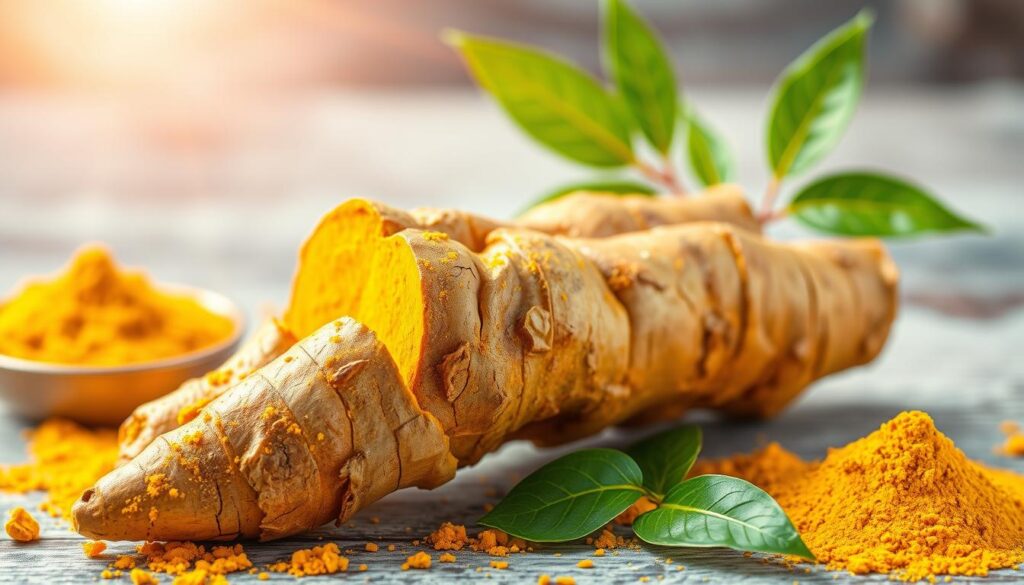
As the scientific evidence continues to accumulate, the benefits of turmeric for inflammation are becoming increasingly clear. By targeting the root causes of inflammation at the cellular level, turmeric offers a natural and potentially effective way to manage chronic inflammatory conditions.
Maximizing Turmeric’s Absorption and Bioavailability
To fully harness the anti-inflammatory benefits of turmeric, it’s crucial to understand how to enhance its curcumin bioavailability. Curcumin, the primary active compound in turmeric, has relatively low absorption and bioavailability when consumed on its own. However, there are several proven strategies to improve its absorption and utilization by the body.
One of the most effective ways to boost curcumin’s bioavailability is by combining it with black pepper. Piperine, a compound found in black pepper, has been shown to increase curcumin absorption by up to 2,000%. This synergistic effect makes turmeric and black pepper a powerful anti-inflammatory duo.
Another way to enhance curcumin’s turmeric root extract dosage is by consuming it with healthy fats. Curcumin is a fat-soluble compound, and pairing it with foods like avocado, nuts, or olive oil can significantly improve its absorption.
Heat can also play a role in increasing curcumin’s bioavailability. When turmeric is cooked or heated, the curcumin becomes more easily absorbed by the body. Additionally, the addition of compounds like quercetin, found in berries and onions, may further enhance curcumin’s absorption.
When using turmeric supplements, it’s important to look for products that incorporate these bioavailability-enhancing ingredients. This ensures that you’re getting the maximum benefit from your turmeric intake and ultimately, experiencing the full anti-inflammatory potential of this remarkable spice.
| Bioavailability Enhancer | Effect on Curcumin Absorption |
|---|---|
| Black Pepper (Piperine) | Increases absorption by up to 2,000% |
| Healthy Fats (Avocado, Nuts, Olive Oil) | Improves absorption due to curcumin’s fat-solubility |
| Heat | Makes curcumin more readily absorbable |
| Quercetin (Berries, Onions) | Further enhances curcumin absorption |
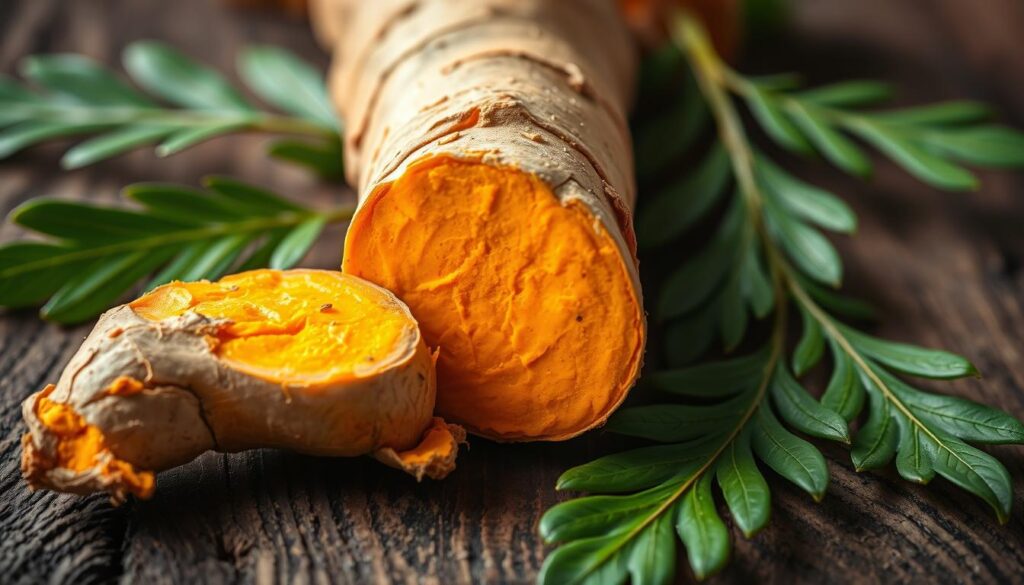
“Curcumin is marketed in various countries, including the United States, India, Japan, Korea, Thailand, China, Turkey, South Africa, Nepal, and Pakistan.”
Turmeric’s Role in Joint Health and Arthritis Management
Turmeric, with its active compound curcumin, has garnered significant attention for its potential benefits in managing joint health and arthritis. Studies have revealed that this vibrant spice may be beneficial for both
osteoarthritis
and
rheumatoid arthritis
.
For individuals with osteoarthritis, curcumin has been found to reduce pain and improve joint function, with effects similar to nonsteroidal anti-inflammatory drugs (NSAIDs). In one study, participants who took 2 grams of turmeric or 800 mg of anti-inflammatory drugs experienced improved knee function and reduced pain levels when walking and climbing stairs.
Regarding rheumatoid arthritis, turmeric may help reduce disease-related inflammation. A review of 15 randomized controlled trials found that curcumin relieved pain and stiffness associated with osteoarthritis as well as or better than conventional NSAIDs like ibuprofen and celecoxib.
When it comes to
recommended dosage for joint pain
, studies have typically used 500-2,000 mg of high-quality turmeric extract or curcumin supplement per day. However, it’s important to consult with a healthcare provider before starting any new supplement regimen, as individual needs may vary.
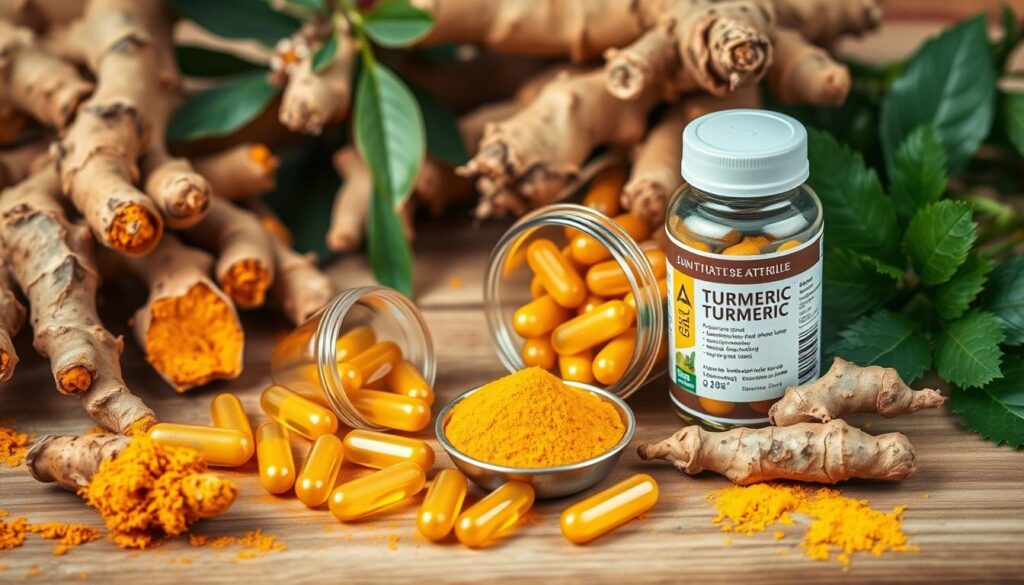
“Turmeric, with its active compound curcumin, has been shown to reduce inflammation and pain associated with both osteoarthritis and rheumatoid arthritis.”
While turmeric and its extracts are generally well-tolerated, high doses may occasionally cause side effects such as nausea, diarrhea, and stomach ulcers. It’s crucial to follow the recommended dosages and consult a healthcare professional, especially for individuals with certain medical conditions or taking specific medications.
Incorporating Turmeric Into Your Daily Diet
Turmeric, the vibrant golden spice, is a versatile ingredient that can easily be incorporated into your daily diet to harness its remarkable anti-inflammatory benefits. Beyond its widespread use in curries, turmeric can be sprinkled on roasted vegetables, added to soups, or used as a flavorful marinade for meats and fish.
One of the most popular ways to consume turmeric is through the comforting and nourishing beverage known as “golden milk.” This turmeric-based elixir combines the spice with warming spices like ginger, cinnamon, and black pepper, along with a healthy fat like coconut oil or almond milk to enhance the absorption of curcumin, turmeric’s active compound.
When cooking with turmeric, it’s important to pair it with black pepper, as the piperine in black pepper can increase the bioavailability of curcumin by up to 2,000%. Additionally, incorporating healthy fats like avocado, nuts, or olive oil can further boost the absorption of this powerful phytochemical.
| Turmeric Dosage for Inflammation | Potential Benefits |
|---|---|
| 500 mg twice daily with food | Reduction in joint pain and inflammation |
| 2-4 grams per day | Improved remission rates in ulcerative colitis |
| 90 mg twice daily | Enhanced memory performance in adults |
| 4 grams per day | Decreased risk of heart attack after bypass surgery |
For those who prefer a more hands-on approach, fresh turmeric root can be grated into dishes or juiced, while the powdered form is a convenient option for cooking and beverages. Regardless of the method, incorporating turmeric into your daily routine can unlock a world of anti-inflammatory benefits and support your overall well-being.
“Turmeric is a powerful anti-inflammatory agent that can be easily added to a wide variety of dishes to support overall health.”
Golden Milk and Other Therapeutic Turmeric Recipes
Turmeric, the vibrant golden spice, has long been revered for its remarkable health benefits, particularly its potent anti-inflammatory properties. One of the most popular ways to incorporate turmeric into your daily routine is through the traditional Ayurvedic drink, turmeric golden milk.
Traditional Golden Milk Recipe
To prepare the perfect turmeric golden milk, combine the following ingredients in a medium saucepan:
- 1/2 teaspoon of turmeric powder
- 1 cup of your preferred milk (dairy, almond, or coconut milk)
- A pinch of black pepper
- Honey or maple syrup to taste
Gently heat the mixture, stirring occasionally, until it reaches your desired temperature. The black pepper helps enhance the bioavailability of the turmeric’s active compound, curcumin, by up to 2,000 percent.
Cooking Tips for Maximum Benefits
For the best results, consider the following tips when preparing turmeric-based recipes:
- Use a high-quality turmeric powder or create a golden paste that can be stored for later use.
- Pair turmeric with healthy fats, such as coconut oil or ghee, to improve curcumin absorption.
- Experiment with adding other anti-inflammatory spices like ginger, cinnamon, or cardamom to your golden milk.
Creative Ways to Use Turmeric
Beyond the classic golden milk, there are countless ways to incorporate turmeric into your diet and reap its remarkable benefits:
- Add a sprinkle of turmeric to your morning smoothie or breakfast bowl.
- Toss roasted vegetables with turmeric, olive oil, and a squeeze of lemon.
- Whisk turmeric into your salad dressings or marinades for added flavor and anti-inflammatory properties.
By exploring the versatility of turmeric, you can easily elevate your meals and snacks while supporting your overall health and well-being.
Safety Considerations and Potential Side Effects
While turmeric is generally safe for most people, it’s important to be mindful of potential side effects and safety considerations. High doses or long-term use of turmeric may cause mild gastrointestinal issues like nausea, diarrhea, or stomach ulcers. People with certain health conditions, such as gallstones, kidney disease, bleeding disorders, or diabetes, should consult a healthcare provider before using turmeric supplements, as it may interact with specific medications like blood thinners and diabetes drugs.
Allergic reactions to turmeric, though rare, are possible. Pregnant women should avoid taking medicinal amounts of turmeric, as it may stimulate contractions and pose risks. To ensure safety, it’s advisable to start with small amounts of turmeric and gradually increase the dosage to assess individual tolerance. Additionally, not all commercial turmeric powders are pure, and some may contain questionable fillers or adulterants, so it’s crucial to choose high-quality, third-party certified supplements to ensure purity and potency.
Despite turmeric’s potent anti-inflammatory properties, it’s essential to be mindful of potential side effects and interactions, especially for those with specific health conditions or on certain medications. By being proactive and consulting with a healthcare professional, you can safely incorporate the benefits of turmeric into your wellness regimen.
FAQ
What are the benefits of turmeric for inflammation?
How does curcumin work as an anti-inflammatory?
What is the historical use of turmeric in traditional medicine?
What are the proven benefits of turmeric for joint health and arthritis?
How can I improve the absorption and bioavailability of turmeric?
What are the potential side effects and precautions when using turmeric?
Source Links
- Turmeric Information | Mount Sinai
- Turmeric Benefits
- 10 Health Benefits of Tumeric and Curcumin
- Turmeric Benefits
- Turmeric and Its Major Compound Curcumin on Health: Bioactive Effects and Safety Profiles for Food, Pharmaceutical, Biotechnological and Medicinal Applications
- TURMERIC: Overview, Uses, Side Effects, Precautions, Interactions, Dosing and Reviews
- Turmeric, the Golden Spice – Herbal Medicine
- Using Turmeric As Anti-Inflammatory
- Can turmeric reduce inflammation?
- Recent Developments in Delivery, Bioavailability, Absorption and Metabolism of Curcumin: the Golden Pigment from Golden Spice
- Impacts of turmeric and its principal bioactive curcumin on human health: Pharmaceutical, medicinal, and food applications: A comprehensive review
- No title found
- Turmeric for Osteoarthritis
- Turmeric and Curcumin
- 7 Health Benefits of Turmeric
- Turmeric tea: Health benefits, types, and preparation
- Golden milk: 10 benefits and how to make it
- Drink a Turmeric ‘Golden Milk’ Latte Every Day to Fight Inflammation
- Anti-Inflammatory Turmeric Golden Milk | Tasty Yummies Natural Health
- Turmeric side effects: Health benefits and risks
- What Are the Side Effects of Too Much Tumeric?

